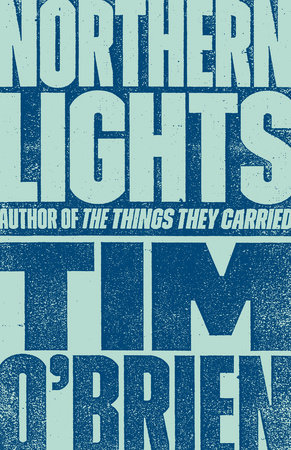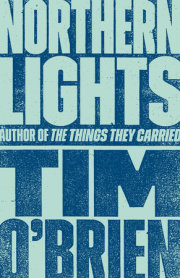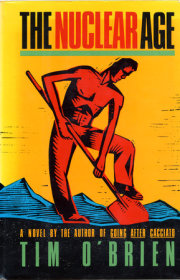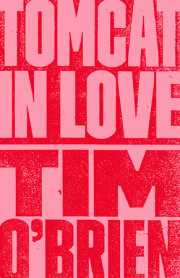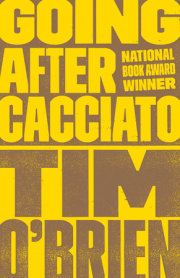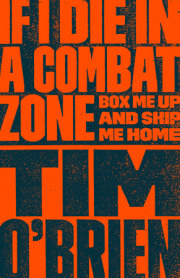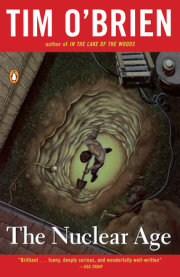Heat StormWide awake and restless, Paul Milton Perry clawed away the sheets and swung out of bed, blood weak, his fists clenching and closing like a pulse. He hadn't slept. He sat very still. He listened to the July heat, mosquitoes at the screen windows, inchworms eating in the back pines, the old house, a close-seeming flock of loons. What he did not hear, he imagined. Timber wolves and Indians, the chime of the old man's spoon in the spit bucket, the glacial floes, Harvey hammering at the half-finished bomb shelter, ice cracking in great sheets, the deep pond and Grace's whispering, and a sobbing sound. He sat still. He was naked and sweating and anaemic and flabby. Thinking first about Harvey, then about the heat, then the mosquitoes, he'd been sailing in a gaunt nightlong rush of images and half-dreams, turning, wallowing, listening like a stranger to the sounds of his father's house.
He sat still.
Harvey was coming home.
There was that, and there was Grace, and there were the mosquitoes crazy for blood against the screen windows.
"Lord, now," he moaned, and pushed out of bed, found his glasses, and groped towards the kitchen.
He returned with a black can of insecticide. Then he listened again. The bedroom was sullen and hot, and he was thinking murder. Carefully, he tied the lace curtains to one side. He ignored Grace's first whisper. He pushed the nozzle flush against the screen window. Then, grinning and naked, he pressed the nozzle and began to spray, feeling better, and he flushed the night with poison from his black can.
He grinned and pressed the nozzle. His fingers turned wet and cool from condensed poison, and he listened: mosquitoes and june bugs, dawn crickets, dawn birds, dragonflies and larvae and caterpillars, morning moths and sleeping flies, bear and moose, walleyes and carp and northerns and bullheads and tiny salamanders. It was dark everywhere. The black can hissed in the dark, ejaculating sweet chemicals that filled the great forest and his father's house. He sprayed until the can was empty and light, then he listened, and the odor of poison buoyed him.
He sat on the bed. Harvey was coming home, and he was dizzy.
"Bad night," Grace whispered.
"Lord."
"Poor boy."
"Poor mosquitoes."
" Shhhhh," she always whispered. "Shhhh, just lie back now. Come here, lie back. You're just excited. Phew, what a stink! Come here now. Lie back."
"Killed a billion of them."
"Shhhh, lie back."
"No use. What a night. Lord, what a crummy awful night."
"Relax now. I heard you all night long."
"Mosquitoes, the blasted heat, everything." He sat on the bed. He was still holding the defused can of insecticide. Poison drifted through the dark room.
"Poor boy. Come here now. Here, lie back. Lie back." Her hand moved to his neck. "Here now," she whispered. "Lie back and I'll rub you. Poor boy, I heard you tossing all night long. Just lie back and I'll give you a nice rub and you can sleep and sleep."
"I'm going for a walk."
"None of that. You just lie still and I'll rub you." Her hand brushed up his spine and rested on his shoulder. Vaguely through the cloud of poison he heard the hum of returning insects, thousands and millions of them deep in the woods, and he began scratching himself. He was flabby and restless. "I'm going for a walk."
"Poor, poor Paul," she said. She removed his glasses. "There now. Just lie back and I'll give you a rub. There. There, how's that now? Better now? Poor boy, you're just excited about Harvey coming home, that's all, that's all. Just lie back and I'll rub you and you can sleep."
"What time is it?"
"Shhhhh. Plenty of time. Still dark, see? You just lie still now."
"Lord," he moaned.
"A nice rub?"
"I'm going for a walk."
"Shhhhh, none of that. Let me rub you."
"Damn mosquitoes."
"I know."
"Scratch. There." He lay back. He grinned. "Guess I killed myself some lousy mosquitoes, didn't I?"
"I guess you did."
"Massacred the little buggers."
"Hush up. You killed them all. You're a brave mosquito killer and now you can just go to sleep. Roll on to your tummy and I'll scratch you."
He turned and let her scratch. He felt better. The room sweated with the poison. He lay still and listened to the returning mosquitoes, the dawn insects, listened to Grace murmur in the dark: "There, there. Is that better? Poor boy, I heard you all night long. Just excited, that's all. Aren't you excited? Harvey coming home and everything, I don't blame you. Poor boy. Now, how does that feel? Better now? You just go to sleep."
"What time is it?"
"Sleep time," Grace said. "Plenty of time."
Her fingers went up and down his back. He felt better. "There, there," she was whispering, and Perry grinned and thought about the poison sweeping like mustard gas through the screen windows. He felt better. He pressed his nose into the sheets, lay still while she massaged his shoulders and his neck and his scalp. "There, there," she was whispering, softly now, her hand moving lightly. She whispered like a mother. She smelled of flannel. He felt much better. Gradually, she stopped rubbing and after a time he heard her slow breathing. Her mouth was open and she was asleep. Her teeth were shining.
Then he tried to sleep. But soon he was listening and thinking again, thinking about Harvey.
He tried to imagine what great changes the war might have made in his kid brother. He wondered what they would first say to each other. It was hard to picture.
All night, he had been thinking.
There would be some changes. The wounded eye, for sure. It was hard to imagine Harvey with a wounded eye. Harvey the Bull. The blinded bull. It was hard to picture. In a stiff and static way, he remembered his brother through a handful of stop-motion images, a few images that had been frozen long ago and captured everything important. All night the images spun in his head: Harvey the Bull; Harvey digging the bomb shelter; Harvey off somewhere in the woods with the old man; Harvey playing football; Harvey the rascal; Harvey boarding the bus that would take him to a fort in California and from there to Saigon or Chu Lai or wherever.
It was annoying. The few sharp images were all Paul Perry really had. It was as though he'd lived thirty years for the sake of a half-dozen fast snapshots, everything else either forgotten or superfluous or lost in the shuffle, and all night long the few sharp images flopped before him, gaunt summary of three decades, growing up on the old man's sermons and winter stories, learning to swim as the old man watched without pity, college, marriage, returning to Sawmill Landing, the bomb shelter and the old man's death, a job, winter and summer and millions of pine and Norway spruce and birch, billions of bugs. All collapsed around the few images. But even the images offered no natural sequence. They were random and defiant, clarifying nothing, and Perry spent the long night in myopic wonder, trying to sort them into an order that would progress from start to finish to start.
He lay still. The mosquitoes were back. On the far wall, the first light formed patches against Grace's dressing mirror.
Again he swung out of bed. He dressed quietly and carried his shoes to the kitchen. Outside, the sky was chalk colored. It would be another dry day. Sunday. Standing on the porch, he urinated into Grace's green ferns, then he laced up his shoes, hurried across the lawn, passed the bomb shelter without looking, followed the path by memory to Pliney's Pond.
There he sat on the rocks.
Copyright © 1999 by Tim O'Brien. All rights reserved. No part of this excerpt may be reproduced or reprinted without permission in writing from the publisher.

